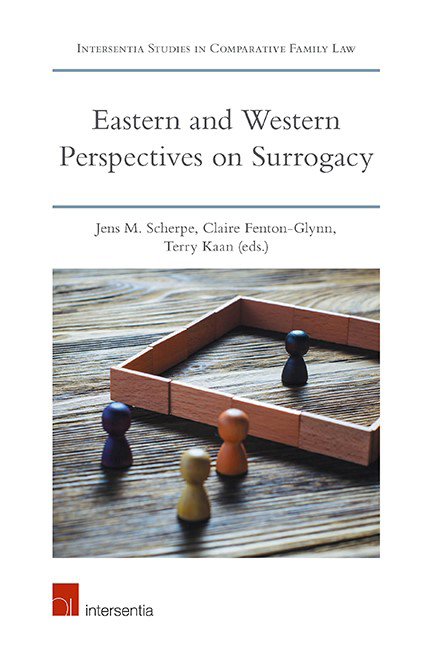Book contents
- Frontmatter
- Preface and Acknowledgements
- Contents
- List of Contributors
- Introduction
- Questionnaire
- PART I WESTERN PERSPECTIVES
- THE PROHIBITIVE APPROACH
- THE TOLERANT APPROACH
- THE REGULATORY APPROACH
- Greece
- Israel
- South Africa
- New Zealand
- Portugal
- Iceland
- THE FREE MARKET APPROACH
- THE INFLUENCE OF INTERNATIONAL COURTS
- PART II EASTERN PERSPECTIVES
- THE PROHIBITIVE APPROACH
- A TOLERANT APPROACH?
- REGULATION THROUGH PROFESSIONAL MEDICAL BODIES
- FROM FREE MARKET TO REGULATION
- PART III COMPARATIVE PERSPECTIVES ON SURROGACY
- Index
- About the Editors
Portugal
from THE REGULATORY APPROACH
Published online by Cambridge University Press: 26 June 2019
- Frontmatter
- Preface and Acknowledgements
- Contents
- List of Contributors
- Introduction
- Questionnaire
- PART I WESTERN PERSPECTIVES
- THE PROHIBITIVE APPROACH
- THE TOLERANT APPROACH
- THE REGULATORY APPROACH
- Greece
- Israel
- South Africa
- New Zealand
- Portugal
- Iceland
- THE FREE MARKET APPROACH
- THE INFLUENCE OF INTERNATIONAL COURTS
- PART II EASTERN PERSPECTIVES
- THE PROHIBITIVE APPROACH
- A TOLERANT APPROACH?
- REGULATION THROUGH PROFESSIONAL MEDICAL BODIES
- FROM FREE MARKET TO REGULATION
- PART III COMPARATIVE PERSPECTIVES ON SURROGACY
- Index
- About the Editors
Summary
GENERAL LEGAL FRAMEWORK
STATUTORY FRAMEWORK
In Portugal, specific legal rules allowing surrogacy were introduced very recently. Law no. 25/2016, dated 22 August 2016, which introduced amendments to Law no. 32/2006, dated 26 July 2006 (‘the Medically-Assisted Procreation Law’), created a legal framework for surrogacy in Portugal in 2016. A specific Regulatory Decree was enacted in 2017 (Regulatory Decree no. 6/2017, dated 31 July 2017) to supplement Law no. 25/2016, governing surrogacy.
In 1997, a change to the Constitution of the Portuguese Republic mandated the Portuguese State to regulate access to medically assisted procreation techniques ‘in such a way as to safeguard the dignity of the human person’, as is stated in its Art. 67 no. 2(e). But it took almost 10 years before the constitutional mandate was finally fulfilled: the law governing Medically-Assisted Procreation Law no. 32/2006, dated 26 July 2006 was enacted in 2006. According to its first version, although the use of medically assisted techniques to procreate was authorised (as long as certain requirements were met) surrogacy was not permitted in any circumstances. Another 10-year period elapsed before surrogacy was accepted by the Portuguese legal system: this happened with the enactment of Law no. 25/2016, dated 22 August 2016, which created many particular safeguards and envisaged the use of surrogacy as exceptional, and only possible when certain strict conditions were fulfilled.
Article 3 of this law expressly referred to the need for regulation of surrogacy, stating that the government had to approve the corresponding Regulatory Decree of the abovementioned Law no. 25/2016 within 120 days after the date of its publication in the Portuguese Official Journal which was 22 August 2016. The deadline was not met as Regulatory Decree no. 6/2017 was published almost one year later, on 31 July 2017. As a consequence, the legal regime governing surrogacy only entered into force on 1 August 2017.
Less than nine months later, on 24 April 2018, the Portuguese Constitutional Court has declared that rules of the statutory framework regarding surrogacy, as they were enacted in 2016, violated provisions of the Constitution of Portuguese Republic.
- Type
- Chapter
- Information
- Eastern and Western Perspectives on Surrogacy , pp. 229 - 258Publisher: IntersentiaPrint publication year: 2019
- 2
- Cited by



